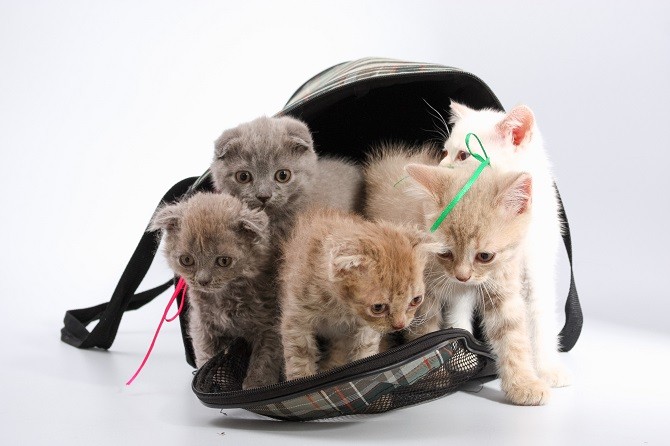As we push into 2020, take a moment and consider how many people you interacted with last year. We don’t typically think of it in these terms, but all of those interactions were opportunities for socialization. Similarly, when our pets interact with us and their fellow animals, it promotes their socialization. And, just as humans have a diverse range of personalities, so do animals. People who are introverts, for instance, are less social by nature than extroverts. The same applies to our feline friends; some cats love attention, people and other animals — others, not so much. However, whether it comes natural to them or not, socialization is important for our kitties.
You may be wondering what “socialization” means in cat owner terms. According to experts, it refers to the process during which a kitten develops relationships with other living beings in its environment. This definition does not mean that it’s impossible to socialize an adult cat. It only means that early handling and interaction is a key step toward raising an engaged, non-fearful cat.
Early-handling

Early handling: Kittens that are stimulated and handled from birth are more confident, more social, more exploratory, faster to mature and are better able to handle stress as they develop. Early handling of kittens decreases their approach time to strangers and increases the amount of time that they stayed with them. The more handling the better but even 15 minutes a day will help to improve later behavior. Regular and frequent handling from birth increases the likelihood that the kitten will relate well to people when placed into a home after weaning at 6 to 9 weeks of age. Therefore, kittens obtained from a breeder or home where they have had frequent contact and interaction with the owners are likely to be more social and less fearful as they develop. Read more at Colorado State University…
Kitten personalities
Genetics play a role in how fearful, playful, sociable or domineering a kitten is by nature, but your influence can change or ingrain these traits. The best time to select a kitten for your family is right around seven weeks of age. Its an ideal stage for bonding, and the socialization potential is at its peak.
You may have acquired your feline friend recently and are wondering how to orient them to the new environment as well as your family, friends and other pets too. Consider taking them to socialization classes, gentle handling by multiple people, introducing them to travel carriers at an early age and expose them to vehicular travelling at an early age once familiarized with the carrier. Nevertheless, do not forget that the younger the kitten, the younger it is to socialize. Put the kittens in a carrier and go to a friend’s house for a brief play-and-cuddle session. If no one is available to host, simply go outside and come back in or go for a drive around the block. Play with the kittens as soon as you return home. Read more at Anti Cruelty…
Socializing older kittens
What if you’ve adopted an older kitten? Use the same recommendations for socializing a younger one, but be more patient. They may not learn as quickly. Also, they may not be comfortable with many things in their new environment. Take your time introducing them to new things. Go with what’s necessary to start, then add other things later.

The main aspect of socialization comes down to simple exposure. Let your kitten experience new things early and often. Have them interact with your friends and other animals, playing with them yourself, take them places. These are just a few basic examples.
Playing with kittens can help them build trust for people. At least two hours a day of play (all together or broken up) can do the trick — it will go by fast, don’t worry! Take time to socialize each of the kittens in a litter individually, while you’re down on their level. Read more at Alley Cat…
As you work on socializing your new feline friend, remember that kittens (and older cats especially) with anxiety and fear can bite and/or scratch you. You may see them spitting, hissing and constantly trying to hide. Remember, these are signs of fear rather than aggression. Take precautions (long sleeves, long pants, eye protection), but remain gentle and loving with slow movements.
Once you’ve raised your kitten to be a well-socialized cat that enjoys interactions with humans and other animals, boarding will be a cinch for both of you. Just be sure to use Fur Babies Pet Resort for your cat boarding services. You can have total peace of mind leaving your feline friend in our expert care.
